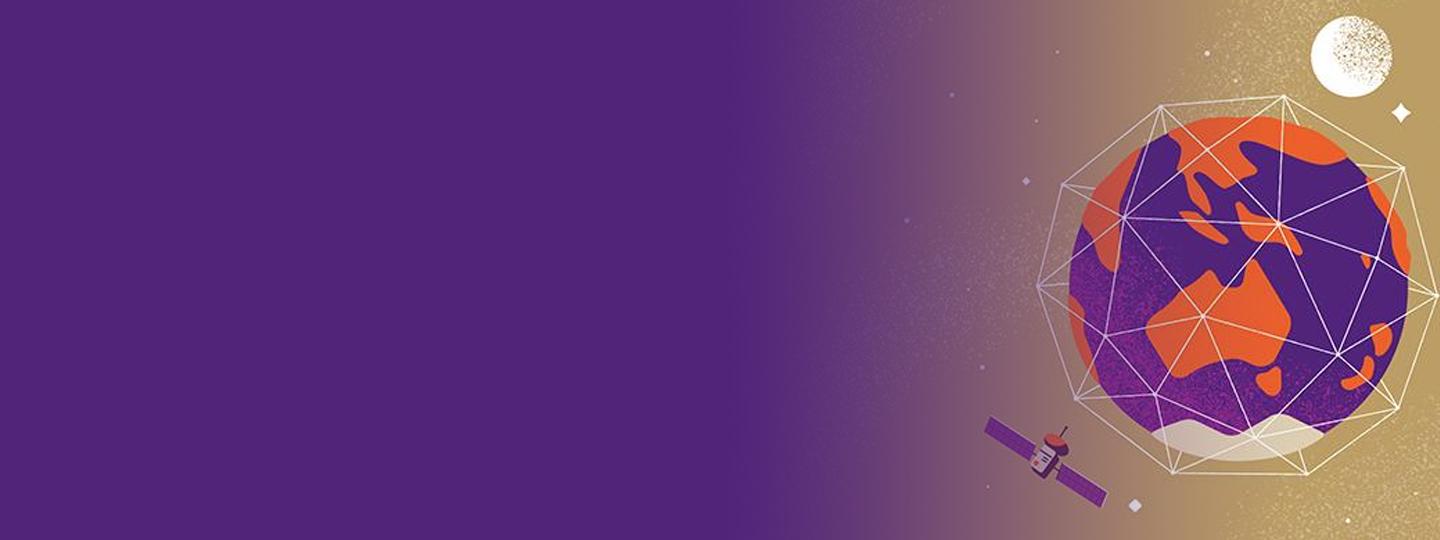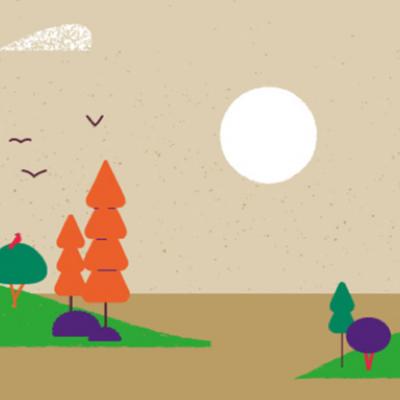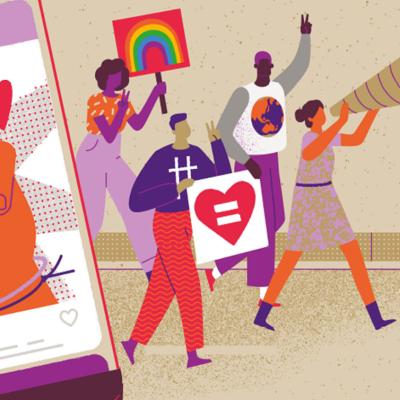In an uncertain future, you need the skills to adapt and the confidence to thrive in any workplace. The UQ Bachelor of Arts (BA) provides this and more, ensuring you’re ready for your career – wherever it might take you.
The worst-kept secret about the Bachelor of Arts is that it’s one of the most enjoyable undergraduate programs around. With so many majors and elective courses to choose from, you’ll get to discover which study areas interest you and pursue them in depth.
It’s genuinely a good time – BA students are some of the happiest people on campus. And then they become some of the most satisfied workers in the labour force.
But then there’s the elephant in the room. The idea – well, the myth – that the benefits of a Bachelor of Arts don’t go any further than it being “fun”. There’s a common misconception that arts graduate careers are slow to blossom or never bloom at all.
Is there any weight to this? Is a Bachelor of Arts a good degree for future employment? Or is it just a nice way to pass your time at uni?
Well, you could speak with almost any UQ BA alumnus, student, staff member or professor to get to the truth of this. We’ve chosen Professor Julie Duck, Associate Dean (Academic) of Humanities and Social Sciences at UQ, Yvonne Oberhollenzer, Manager of the faculty’s Student Futures Team, and Bachelor of Arts (Honours) graduate / PhD candidate Tiarni Miller.
Are Bachelor of Arts graduates employable?
Yes. According to 2020 survey data, 87% of graduates who finished studying humanities, culture and social sciences in 2017 were employed by 2020. This is on par with science and mathematics graduates.
For UQ specifically, this statistic is even higher. We see 88.1% of humanities, culture and social sciences graduates in employment within 3 years of graduation.
But the sheer volume of jobs that Bachelor of Arts graduates can get isn’t the most impressive part. It’s the wide variety of career opportunities that make this program stand out to Associate Dean (Academic) Julie Duck.
“In a recent study, we found that UQ Bachelor of Arts graduates now work in almost 7000 different organisations globally in diverse growth industries,” she says.
These industries, to name just a few, include:
- education
- government
- law
- IT
- healthcare
- financial services.
“The Bachelor of Arts sets you up to thrive in a diverse range of careers. You aren’t given one professional pathway – you’re given many.”
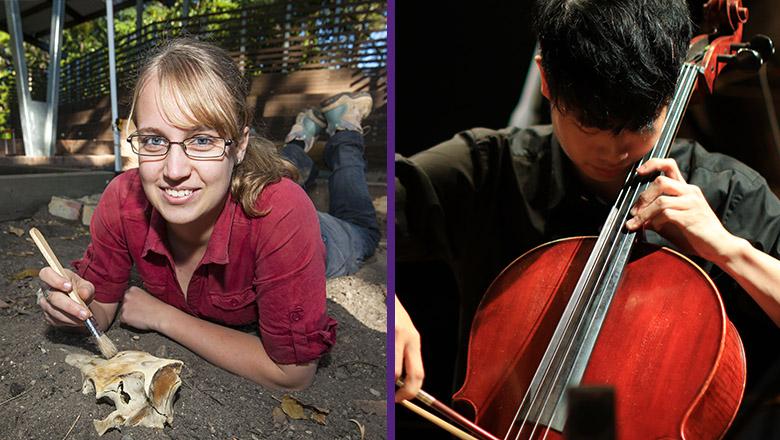
From archaeology to music, the Bachelor of Arts offers a comprehensive range of study areas.
The BA’s ability to combine with many other programs as a dual degree is also attractive for students with professional ambitions.
“The Bachelor of Arts is a fantastic complement to study in another area, providing you with a wider range of professional pathways,” says Julie.
Why are Bachelor of Arts graduates so employable?
BA graduate and PhD candidate Tiarni Miller believes her Bachelor of Arts prepared her for a successful career through two key areas: skills and confidence.
“My Bachelor of Arts degree has equipped me with the skills necessary to delve into higher research,” she says.
“Over the course of my degree, I was given the opportunity to try a range of minors and electives, effectively enabling me to find my niche within academia.”
Yet Tiarni knows the abilities she acquired would be just as valuable in a professional setting as an academic one. The skills she has developed during the BA include:
- critical thinking
- written communication
- project management
- data collection and analysis
- organisation
- leadership
- time management
- adaptability – especially relevant in COVID times.
Tiarni is also a perfect example of another aspect that makes Bachelor of Arts graduates so successful in the workforce – they are genuinely passionate about what they study and do. Tiarni’s passion for studying history to improve the future began way back when she watched documentaries with her family while growing up.
“This passion was consolidated after I studied modern history in my senior years of high school and travelled around the world,” she says.
“I believe that in order to tackle our contemporary problems, we must have an understanding of our history.”
After her arts degree, Tiarni is now completing a PhD and hopes to become a history professor.
Bachelor of Arts graduates don’t just get jobs – they get jobs they love. According to a Deloitte report, humanities degrees provide a high overall rate of job satisfaction.
Benefits of the Bachelor of Arts: employability is just the beginning
Yvonne Oberhollenzer, Manager of the Humanities and Social Sciences Student Futures Team, sees the value of the program time and time again with each graduating cohort. And as a BA graduate herself with a 15-year career, she’s in a unique position to comment on the benefits of a Bachelor of Arts.
“When I first graduated, it was clear that my degree had honed my writing skills and strengthened my ability to synthesise diverse information sources quickly and succinctly,” says Yvonne.
Yvonne's degree also equipped her to see the ‘grey’ in situations that others might perceive as black and white.
“So often we are told that something is right or wrong, good or bad,” she says.
“With a Bachelor of Arts degree, you start to see the world from many perspectives and realise that one person’s reality isn’t necessarily the same as another.”
“I believe this willingness to acknowledge multiple perspectives has helped me become a more collaborative and inclusive leader.”
The way society is evolving means emotional intelligence skills are becoming even more important.
“Interpersonal, human-centric and creative roles are not easily automated,” says Yvonne.
“Social, cultural and technological challenges are increasingly global and complex, requiring multidisciplinary approaches and perspectives. Bachelor of Arts graduates are adaptable, culturally capable workers who can empathetically communicate with others and address complex human challenges.”
Another benefit of the Bachelor of Arts is the freedom and flexibility it provides. While the many options – majors, minors, electives – can seem daunting at first, this really is a blessing.
Julie recommends using your first semester as a chance to experiment with the different majors available.
“You’d be amazed at how many graduates tell me that they stumbled upon a course that completely changed their study direction and shaped their career after graduation,” she says.
Tiarni agrees this is a great approach for students who don’t have their career goals set in stone yet.
“Don’t be afraid to try a few majors before you commit to your study plan,” she says.
“A Bachelor of Arts enables you the flexibility to explore which disciplines suit you.”
When doing a dual degree, your elective options will be slightly more restricted. You’ll need to be more careful when choosing your major, but don’t stress – the Humanities and Social Sciences Student Administration team can help.
Much more than classes and assignments
A key element of what makes UQ Bachelor of Arts graduates so employable is the wide range of extracurricular activities available. This is something Tiarni takes full advantage of.
“I am currently a Student Partner in the Humanities and Social Sciences (HASS) Student Futures Team, through which I work within a team to improve the HASS student experience,” she says.
“I also work as a Historical and Philosophical Inquiry Student Ambassador and Student Representative, working towards the inclusion of HASS student voices within broader university dialogues.”
“I also joined the UQ Modern History Society and spearheaded, scripted and hosted our very first history podcast, Historical Hi-Fi. I look forward to continuing in these endeavours and encourage commencing students to do the same.”
Yet, if you can believe it, this is only scraping the surface of all the activities BA students can participate in beyond their classes. Yvonne and the Future Students Team are dedicated to finding ways for students to connect to academic and professional communities and enhance their employability.
These extracurricular opportunities include:
- volunteering opportunities
- leadership development programs
- career mentoring
- online career seminars
- industry placements and internships.
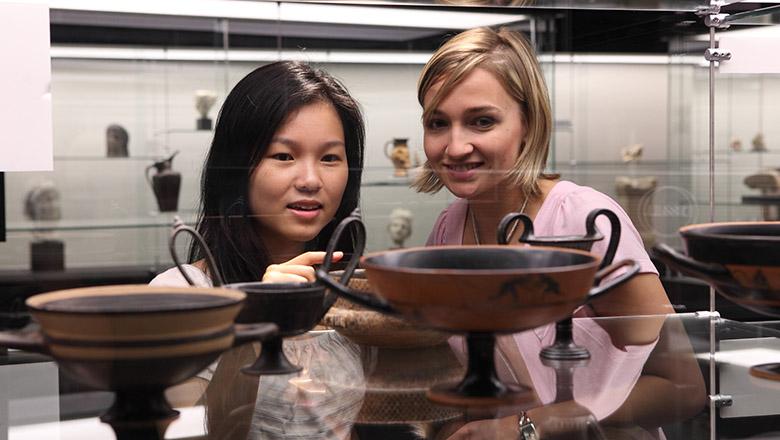
Some arts students can gain valuable experience by volunteering at the UQ Antiquities Museum
“There are also over 30 student clubs and societies that focus on disciplines in the humanities and social sciences,” says Yvonne.
“These provide a great way to get connected with like-minded students.”
Final thoughts
The message from Tiarni, Yvonne and Julie is clear. The Bachelor of Arts isn’t just a good degree for starting a career – it’s a great degree for starting almost any career. It teaches the fundamental skills to succeed in the future of work and the personal confidence to thrive in any profession, complemented by programs and extracurricular activities designed to prepare you for life beyond university.
Learn more about the Bachelor of Arts, including requirements, majors and scholarships.

